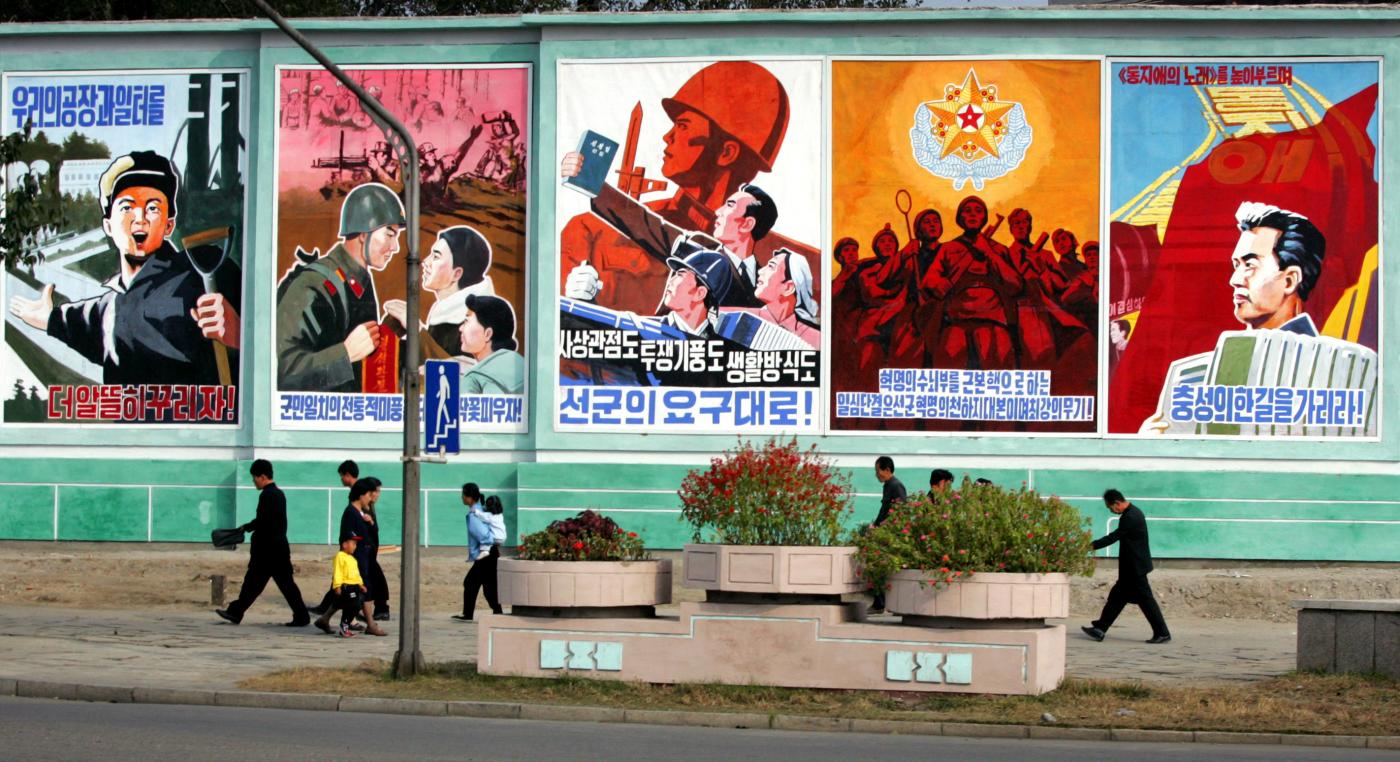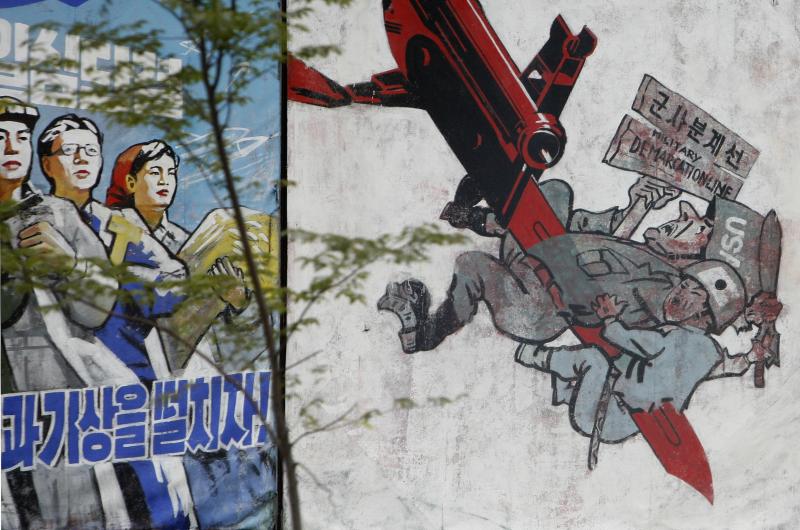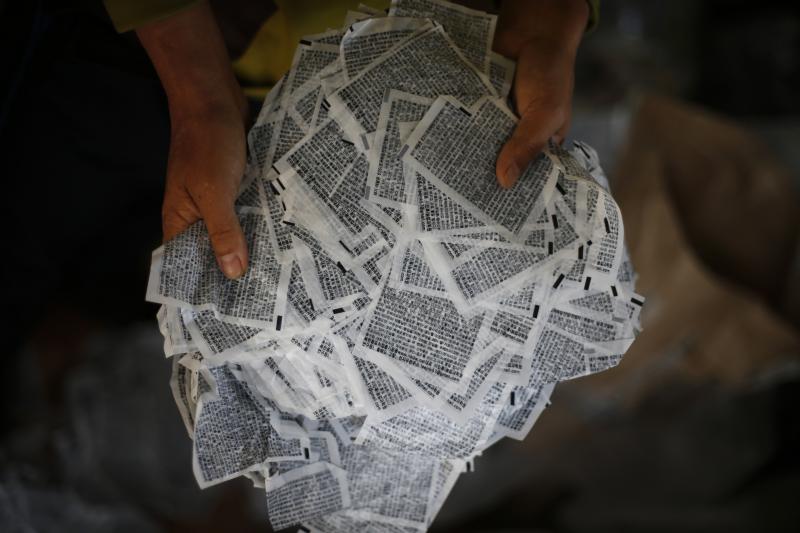PBS: Escaping Eritrea … [Read More...] about ካብ ውሽጢ ቤት ማእሰርታት ኤርትራ
North Korea’s Propaganda Problem: Why the Hype Isn’t Working

These days, affiliates of North Korea’s Chosun Workers’ Party Propaganda and Agitation Department have been hard at work on a massive new propaganda campaign. Their goal is to shore up North Korean leader Kim Jong Un’s power base ahead of the 7th Party Congress, to be held in May. And so, the department has vehemently claimed that, far from costing North Korea dearly, Pyongyang’s recent nuclear tests and satellite launches were actually lauded by the international community. Kim has also promised to introduce groundbreaking changes to North Korean social policy that, the party claims, will significantly improve the welfare of North Koreans. In reality, however, anger against Kim Jong Un is mounting among the residents.
It is unclear whether any major reforms are in the offing. But the insistence on international acclaim is clearly a fiction. And as they attempt to roll out the latest work of North Korean political fantasy, Pyongyang’s spin-doctors are encountering a more skeptical populace than ever before. When asked about North Korean nuclear tests, one resident told the Daily NK that “there’s no way we’re believing what they say about the nuclear test and rocket launch this time around.” After all, in the age of cellular communication, even unsanctioned news can spread within the hermit kingdom. The Egyptian Telecom company that co-operates North Korea’s mobile provider, Koryolink, said that 2.4 million subscribers had signed up by 2014. Although those numbers may be dubious, cell phones have assuredly become a common sight in major cities around the country. As a result, scores of North Koreans learned of the new UN sanctions against Pyongyang, something the Kim regime might have previously been able to keep under wraps, over their phones. Even worse for Kim, it has now become common knowledge that both China and Russia are participating in the sanctions, prompting many North Koreans to blame the North Korean authorities, not the international community, for their economic hardship.
In short, North Korea’s propaganda campaigns don’t go as far as they used to, the population is more connected than ever, and even fewer are willing to believe the official party line. And all this comes at a time when Pyongyang is facing tougher circumstances than usual.
SELLING A LINE

Propaganda has long served as a vital component of Pyongyang’s grip on power. It has bolstered the Kim family’s claim to legitimacy, and has allowed an impoverished nation to carry on despite ever-worsening conditions. Its position in North Korean life is as central as the Kim family itself, and its importance is hard to overstate. The state’s foundational stories are, themselves, works of propaganda by the first Kim, Kim Il Sung. According to his version of the birth of North Korea, South Korea, a puppet of U.S. imperialism, is responsible for starting the Korean War. Kim is portrayed as a bona fide Korean nationalist guerilla fighter who personally pushed the Japanese off the peninsula in WWII, only to repel a U.S. invasion five years later. In this narrative, without Kim’s leadership, Cranfield University Professor Hazel Smith writes, “the North would be living under foreign occupation by the United States.”
In reality, however, Kim and his guerillas were overwhelmed by Japanese troops in Manchuria, China, sometime around 1940–41. Kim then fled to the Soviet Union and joined the Soviet army. The Soviet 88th Special Rifle Brigade, the reconnaissance unit in the Soviet Army that Kim had joined, was supposed to participate in an attack that would trounce the Japanese army in a final push on Manchuria. The initial campaign against the Japanese was more successful than even the Soviets had predicted, though, and the Soviet 88th was not included in the counteroffensive, stripping Kim of the chance to participate in liberation of his homeland. When Kim finally landed in Korea wearing a Soviet Army uniform, he instructed his inferiors to lie about the less than picturesque return to the motherland. Indeed, much of post-war North Korean propaganda was focused on deflecting criticism that Kim was merely a Soviet lackey. The campaign was generally successful, and Kim rebranded himself as a nationalist hero with pure origins.
The war became known as the “Great Fatherland Liberation War” and June, the anniversary of the start of the war, became known in North Korea as “Anti-America Month,” replete with celebratory events and rallies throughout the country’s schools and factories.
Kim Jong Il was promoted to director of the Propaganda and Agitation Department in 1968 during his father’s reign. He used the post as a way to flatter his father and outshine his uncle, Kim Yong Ju, as they competed to become the heir to the throne. Kim brought the cult of personality to life with government initiatives like Paektusan Productions and Mansudae Art Studio—the former being a movie studio and the latter a haven for North Korean artists. Under his order, these efforts created paintings, movies, and artwork that glorified Kim Il Sung. In this way, Kim paved the way for his own success by controlling the perceptions of his father, and in some cases, even changing the definitions of power within the regime itself. For example, North Korea’s Dictionary of Political Terminologies, published in 1970, described hereditary succession as “a means to perpetuate dictatorial rule.” That definition was unceremoniously deleted from the subsequent edition released in 1972 as the rest of the Communist world shunned such practices elsewhere. After witnessing communist countries begin to crumble around the world in the late 1980s, Kim Jong Il learned just how destructive and contagious “imperialist ideology and bourgeois culture” could be, as they were blamed for the crumbling of Communist ideology within North Korea. To block out the corrosive effects of foreign media and protect his own legitimacy, Kim established a “mosquito net” that limited telecommunications use to financial transactions—blocking any content that could provoke political instability.
But starting in the mid 1990s, however, information began to leak through Pyongyang’s fingers. In those years, a massive famine debilitated state agencies and wreaked havoc on North Korea’s infrastructure. To save the country, Kim turned a blind eye to some technically illegal market trading within the country and cracked open the door to intensified trade with China. The government backwardly legitimized the grassroots capitalism that emerged from below on July 1, 2002. In truth, most North Koreans have never even heard of the July 1 reforms, which legally codified the state’s pre-existing view: reluctant acceptance of the emergence of private markets. But people could see with their own eyes what was happening on the street. The nation’s increased dependence on Chinese goods dispelled the myth that North Korea was the envy of the world. The regime was in no position to appear generous. Once the famine poked a hole in the North Korean regime’s blanket on information, the rest of the regime’s historical narrative started to be questioned as well.
Market trading and access to foreign media sources have grown since the famine. The Chinese border has become increasingly porous as the state relinquishes its monopoly over foreign trade, and smuggling has increased in scale and frequency. Surveys conducted by Stephan Haggard, Professor at UC San Diego and Marcus Noland, Director of Studies at the Peterson Institute for International Economics demonstrate that a person’s approval of the government is inversely related to how much of his or her household income is derived from market sources. This is largely due to a shift in values prompted by the end of the public distribution system. The government’s role changed significantly—Pyongyang was once the provider of goods, but has now become an obstacle to their acquisition. Residents have come to consider market trading as their right, and therefore, strongly resent encroachments on this domain by the regime.
Another aspect of a more porous border has led average North Koreans to have less faith in the regime’s propaganda machine, namely, the proliferation of South Korean dramas. DVDs of South Korean dramas smuggled through China were the most prevalent form of foreign media, according to a 2010 survey of defectors. Haggard and Noland’s research indicates that the percentage of North Koreans who have watched or listened to foreign media has climbed from 30 percent to 55 percent since the famine era. Furthermore, a survey taken of refugees and North Koreans traveling outside of the country found that 35 percent had listened to foreign radio broadcasts within North Korea, according to a survey done by the Broadcasting Boards of Governors. In addition, an NGO called the North Korea Strategy Center annually smuggles 3,000 USB sticks filled with foreign content into the country. The North Korean USB program has become one of the more popular initiatives within the country as well; some have even taken to wearing one as a fashion statement, indicating that they have access to a computer.
Lately, even the Anti-America Month celebrations have been a little less robust—in fact, many North Koreans have begun to snub them entirely, believing that North Korea was indeed the aggressor in the war after all. One source within North Korea said, “Ever since the General (Kim Jong Un) came to power, the frustrations of residents have been building up. And they are criticizing propaganda claiming that the Korean War was started by the United States and the South, calling it a lie.” The regime’s continued attempts to convince the residents to the contrary are especially exasperating for those who know the truth, and would rather be earning money than attending events celebrating fictitious holidays. This is a devastating turn of events for the regime, whose legitimacy rests on its identity as the rightful representative of the Korean people.
And as the regime finds itself unable to provide payments to its workers, propaganda events, meant to stoke anti-U.S. and anti-South Korean sentiment and to serve as refreshers on North Korean history, have become increasingly burdensome for average North Koreans, who are forced to take time away from their informal money making enterprises in order to participate. In turn, such events have become a source of great irritation.

To be sure, some believe that the public skepticism is overstated. Kookmin University Professor Andrei Lankov recently wrote in the Korea Times that most North Korean defectors believe the Kim regime’s claims about the war. He said, “Judging from my experience with North Korean refugees, only a handful of North Korean intellectuals have secretly entertained doubts as to whether the war was indeed started by Washington.” The division between those who believe the North Korean version of the story and those who don’t is mostly drawn along socioeconomic lines. According to defectors interviewed by NK News, an English-language news site headquartered in Washington, D.C., there is a wide gap between rural and urban responses to propaganda. Among the defectors interviewed, two said that about 50 percent of North Korean residents believe what the regime says, one said that 60 percent believe all or some, and another said that only 20 percent believe the party line. Specific figures on how many North Koreans believe the Kim regime’s propaganda are impossible to obtain, but signs of it are beginning to blossom—North Koreans turning away from the state newspaper, making jokes about the Kim family, and becoming less willing to report on peers for accessing foreign media—are everywhere.
A PEOPLE’S HISTORY
French anthropologist Claude Lévi-Strauss wrote that people become unhappy when history comes too close to them. One could argue that people become unhappy when the manipulation of their history is laid bare. No truer is this than in North Korea, where historical fabrications are butting up against poverty, dysfunction, and governmental mismanagement—all of which has become unavoidably apparent under Kim Jong Un’s tenure.
This skepticism cuts against the heart of neo-juche revivalism, an ideology that attempts to bring back the glory days of socialism in North Korea. But the glory days are long gone, if they ever existed at all. The Kim family has been mortgaging its own claims to North Korean power for generations. Without providing results for everyday North Koreans, the strategy has become unsustainable. And instead of making hard choices to find a strategy that would keep North Korea afloat, the Kim regime is trying to buy time through propaganda that doesn’t get the political mileage it once did.
Unfortunately, expectations that increased skepticism and ill will toward the regime will result in a revolution are most likely unfounded. Recently, the regime has ratcheted up its international provocations with a nuclear test, missile launch, and nuclear threats. At the same time, authorities have cracked down domestically by banning morning market trading and mobilizing residents to prepare for the7th Party Congress. If anything, these developments point to the fact that the regime’s grasp on power remains as strong as ever.
The stage is set for Kim Jong Un to make a dramatic move. There hasn’t been a Party Congress in 36 years. So why now? Lee Min Reung, head researcher at the Sookmyung Institute of Security Studies, believes Kim will announce unprecedented economic reforms. Doing so would indicate that Kim retains at least a modicum of interest in the welfare and approval of his subjects. If he goes the other way, he can expect antipathy to reach a fever pitch, just as it did in 2009 when a currency redenomination wiped out the cash savings of market traders. Thanks to the people’s newly skeptical attitudes and their ability to quickly communicate with one another through mobile phones, it has become very difficult for the regime to earn loyalty without making a contribution to their welfare or else getting out of their way so they can earn money. In other words, Kim is no longer able to spit in people’s faces and tell them it’s raining. Hard times are ahead if he fails to grasp that fact.
